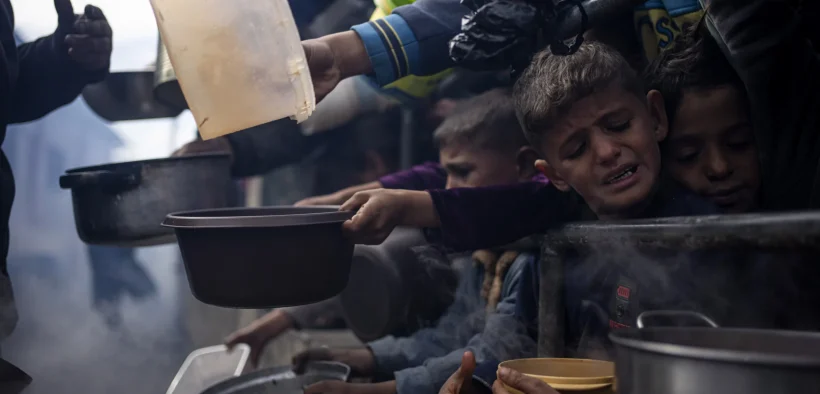Israel helped avert a famine in Gaza but gets no credit
Share

This is the headline you never saw: “Famine averted in Gaza; Israel and UN facilitate surge of humanitarian aid.” The news is true, anchored in data collected by the leading global authority on food shortages. But the media told a different story, with a typical headline declaring, “Half a million in Gaza face starvation, report says.”
One might think good news would be welcome given all the suffering in Gaza, but bad news is more useful for Israel’s critics: It can be used to batter Jerusalem into making concessions, and it advances false claims that Israel is deliberately starving the people of Gaza, or even committing genocide.
The unwieldy name of the global authority on famines is the Integrated Food Security Phase Classification. It is a partnership that brings together United Nations agencies, national aid authorities, and humanitarian groups. Despite its relative obscurity, the IPC has the dominant voice when it comes to evaluating the severity of food shortages.
In March, the IPC declared “famine is imminent” in Gaza and it would strike no later than the end of May. “Famine” has a very precise meaning for the IPC. It is the fifth and final stage on the IPC food crisis scale. If a famine takes hold, it means that a substantial number of individuals are dying every day from starvation or the combination of starvation and disease.
Once the IPC issued its warnings, influential leaders began to insist that a famine in Gaza had already begun. Samantha Power, the Biden Cabinet member who runs the U.S. Agency for International Development, testified before Congress that she had received credible reports of famine setting in. Cindy McCain, head of the U.N.’s World Food Programme and wife of late Sen. John McCain, announced in early May that Gaza was already enduring a “full-blown famine.”
Ironically, a surge of aid into Gaza had already begun by the time Power and McCain made their assertions. Israeli government data show this to be the case, but so do records kept by the U.N., a rare point of agreement between bitter opponents. Since the war began, the U.N. Relief and Works Agency, the body charged with aiding Palestinians, has made public how many truckloads of goods enter the Gaza Strip. In February, that figure fell to 2,874 truckloads, or fewer than 100 per day. That figure rose to 4,993 in March and 5,671 in April, close to 190 loads per day. There is no good U.N. data for May or June because fighting in southern Gaza disrupted its monitoring efforts. Israel contends the surge continued.
By the end of May, it was clear to those in Gaza that there was no famine, even in northern Gaza, where the IPC projected that conditions would be the worst. Yet a typical headline read, “Access to aid in Gaza was dire. Now, it’s worse.”
On June 25, the IPC released the main conclusions from its updated assessment — the full report is not yet available. The IPC presented facts but cloaked them in language that ensured the media would see only misery, not a catastrophe averted.
In terms of the IPC scale, the percentage of Gaza residents in Phase 5 has fallen from 30% to 15%, despite the IPC’s projection in March that it would increase to 50%. Likewise, the percentage in Phase 4, a rung below famine, declined from 40% to 29%. It would be an understatement to say that the IPC did not emphasize the inaccuracy of its forecast or seek to explain what had changed. Rather, it summarized its findings as follows: “Risk of Famine as 495,000 people face catastrophic acute food insecurity.”
The IPC’s findings received extensive media coverage, as they did in March. And that coverage dutifully echoed the IPC’s message. A sample of headlines includes “High risk of famine persists across Gaza, global hunger monitor says” from Reuters, “Half-million Gazans face ‘catastrophic’ hunger levels, U.N.-backed report says” from the Washington Post, and “Famine will loom over Gaza as long as conflict rages, report warns” from Politico.
CLICK HERE TO READ MORE FROM THE WASHINGTON EXAMINER
In late May, when the surge of aid into Gaza was already having a substantial impact, the prosecutor of the International Criminal Court sought warrants for the arrest of Israeli Prime Minister Benjamin Netanyahu and Defense Minister Yoav Gallant. The first of their alleged war crimes is “starvation of civilians as a method of warfare.”
No effort may be sufficient to get the ICC or the various arms of the U.N. to treat Israel fairly. But it is essential for Americans, from the president on down, to see through the critics’ sleight-of-hand, lest we abandon a loyal ally in its time of greatest need.
David Adesnik is a senior fellow and director of research at the Foundation for Defense of Democracies.













